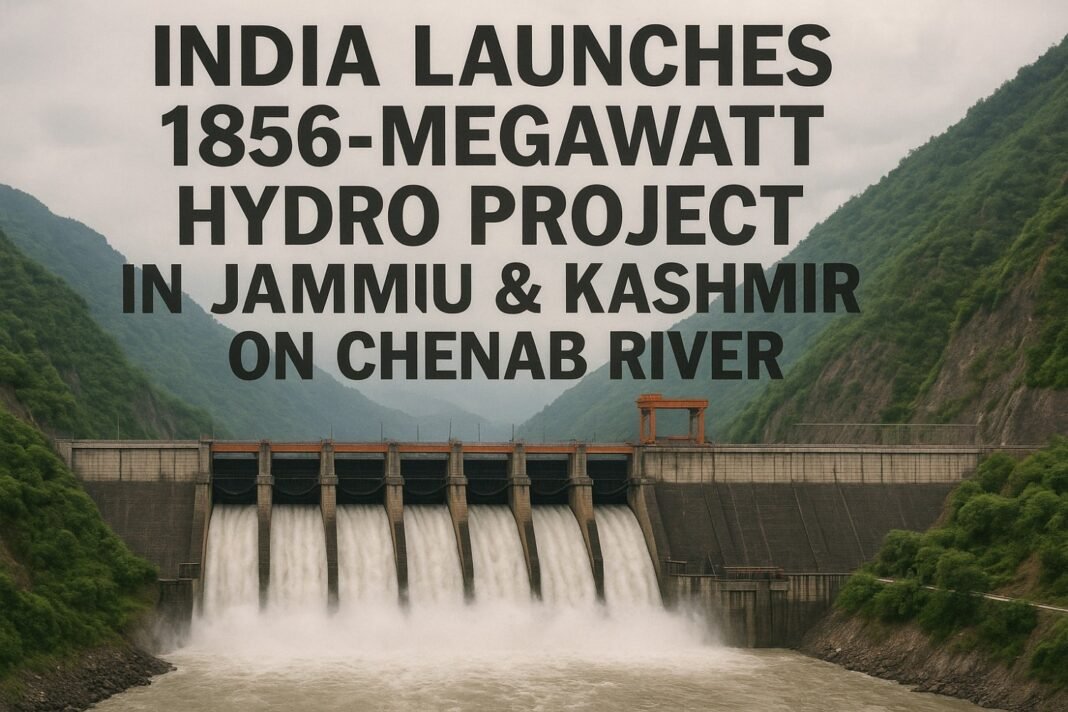India Unveils Largest Hydropower Project in Jammu & Kashmir
India has initiated the construction of its largest hydroelectric power project in Jammu and Kashmir, marking a significant shift in its approach to water management and regional energy development. The 1,856-Megawatt Sawalkote Hydroelectric Project, which will be built on the Chenab River, is the first of its scale to proceed without the usual clearance from Pakistan under the now-suspended Indus Water Treaty.
The project comes on the heels of India’s announcement to put the Indus Water Treaty in abeyance following the terrorist attack in Pahalgam on April 22, which New Delhi attributed to elements based in Pakistan. Officials stated that the treaty will remain suspended until Islamabad takes concrete and irreversible steps to eliminate cross-border terrorism.
Tender Process Begins Amid Strategic Push
The National Hydroelectric Power Corporation (NHPC) has begun the international tendering process for the project. On Wednesday, the company issued an International Competitive Bidding (ICB) notice, inviting global firms to submit proposals. The deadline for bid submissions is set for September 10. The Sawalkote project will be executed in collaboration with the Jammu and Kashmir Power Development Corporation under a Build-Own-Operate-Transfer (BOOT) model. According to the agreement, NHPC will operate the project for 40 years, after which ownership will revert fully to the Union Territory of Jammu and Kashmir.
The estimated cost of the project is ₹22,704 crore and it will be developed in two phases. The long-pending project, first conceptualized in the 1980s, had been stalled due to a mix of administrative delays and consistent objections from Pakistan, which raised concerns about the impact of damming the Chenab River, a water body that falls under its rights per the 1960 treaty.
Treaty Provisions and India’s Rights
Brokered by the World Bank, the Indus Water Treaty had allocated the waters of the eastern rivers—Ravi, Sutlej, and Beas—to India, and the western rivers—Indus, Jhelum, and Chenab—to Pakistan. While India retains the right to limited irrigation and to construct run-of-the-river hydroelectric projects on the western rivers, such developments require prior approval from the Indus Water Commission, particularly regarding design and dam height.
However, India’s decision to pause treaty obligations means that for the first time in decades, it is going ahead with a project of this magnitude without seeking no-objection certification from Pakistan.
Environmental and Social Clearances in Place
As part of preparations, the central government has removed major regulatory hurdles that had impeded earlier progress. The Forest Advisory Committee under the Ministry of Environment recently granted approval for the diversion of nearly 3,000 acres of reserved forest and jungle land in the region to facilitate construction. This strategic clearance is seen as a key step in enabling international bidding and swift project execution.
However, the project will require the relocation of residents from nearly a dozen villages. Authorities have confirmed that hundreds of families will be affected and that detailed rehabilitation and compensation plans are under development.
Historical Context and Strategic Value
While the J&K State Power Development Corporation had initiated preliminary work on the Sawalkote project over a decade ago—reportedly spending more than ₹400 crore—the project remained in limbo until NHPC was brought on board in 2021. The move came during a period of central rule in the Union Territory, allowing for more direct administrative decisions and the clearing of pending procedural bottlenecks.
Officials describe the project as not only crucial for meeting the region’s energy demands but also as a strategic tool for asserting India’s water rights. With growing emphasis on clean energy and reduced reliance on fossil fuels, the Sawalkote plant is expected to play a pivotal role in powering northern India.
As India proceeds with this landmark infrastructure initiative, regional watchers are closely monitoring the geopolitical and environmental implications, particularly in light of deteriorating bilateral relations between India and Pakistan








